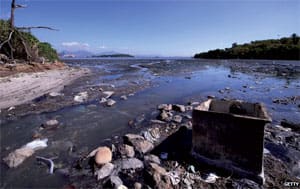A drug-resistant “super bacteria” has been discovered in the waters where 2016 Rio de Janeiro’s Olympic sailing events are scheduled.
Brazil’s health research institute, Instituto Oswaldo Cruz, said it has discovered bacteria that produce an enzyme that make it resistant to most forms of treatment in water samples taken from various spots along the Carioca River. Among the spots is where the river flows into the city’s Guanabara Bay, site of the 2016 sailing and wind surfing events.
Bacteria with the so-called KPC enzyme are difficult to treat. The institute said no instances of infection resulting from the contaminated water have yet been detected but warned of possible danger to swimmers.
According to the institute, even if individuals don’t immediately fall ill, those who come into contact with the bacteria run the risk of becoming carriers of the microorganism. Carriers can take these resistant bacteria back to their own environments and to other people, resulting in a cycle of infection.
Seventy percent of sewage in this city of 12 million is untreated and flows, raw, into rivers, onto beaches and into the Guanabara Bay. The state of water quality has been a major worry leading up to the 2016 summer games.

